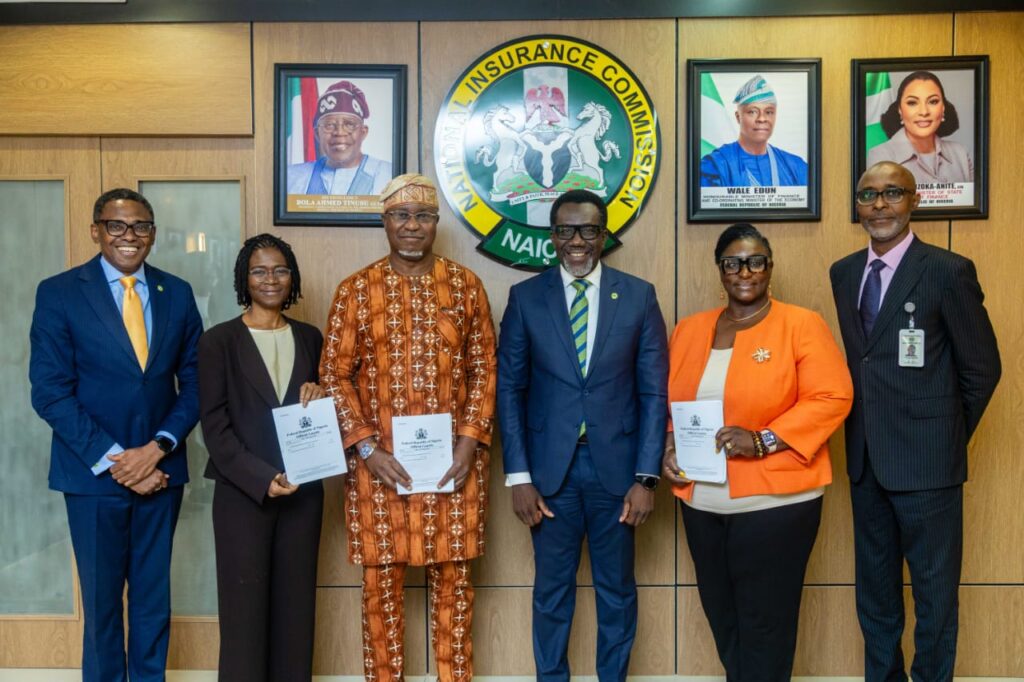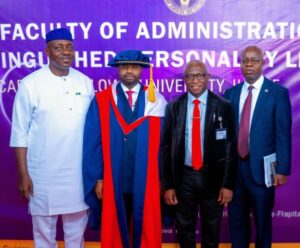NAICOM launches NIIRA implementation working groups to advance insurance sector reforms

From left: Mr. Ekerete Ola Gam-Ikon - Dep. Commissioner for Insurance Finance & Admin, Adetola Adegbayi, Mr. Shola Tinubu, Mr. Olusegun Ayo Omosehin- CFI, Dr. Yeside Oyetayo and Mr. Ajibola Bankole - Director Inspectorate
The National Insurance Commission (NAICOM) has taken a decisive step toward transforming the nation’s insurance landscape with the launch of a comprehensive Implementation Strategy for the National Insurance Industry Reform Agenda (NIIRA) 2025.
A statement from NAICOM today said at a high-level Strategy Meeting held in Abuja, the Commissioner for Insurance, Mr. Olusegun Ayo Omosehin, inaugurated three core working groups to drive the structured and coordinated execution of NIIRA’s objectives across the insurance value chain.
The NIIRA 2025 signed into Law earlier this year—sets out a holistic roadmap for regulatory reform, financial inclusion, digital transformation, and compulsory insurance enforcement. Its implementation aims to align Nigeria’s insurance industry with international standards while improving public confidence and economic resilience through risk protection.
Driving the NIIRA Vision
Speaking during the strategy session, the Commissioner for Insurance reaffirmed NAICOM’s commitment to ensuring that the implementation phase of NIIRA is inclusive, data-driven, and results-oriented. He emphasized that the strategy would consolidate ongoing reforms within the Commission and reposition the insurance industry as a key player in national economic growth.
“This marks the beginning of a coordinated journey toward achieving a stronger, more transparent, and technology-driven insurance industry. The NIIRA 2025 is not just a regulatory document—it is a blueprint for building an insurance sector that protects lives, businesses, and investments across Nigeria,” Mr. Omosehin stated.
He further underscored that the new working groups would serve as engines of reform, ensuring that critical policy objectives are translated into measurable outcomes.
Key Implementation Working Groups
Compulsory Insurance Working Group (with Mr. Shola Tinubu as Chairman)
Mandate: To strengthen the enforcement and adoption of all compulsory insurance schemes across the country, including Motor (Third Party), Builders Liability, Group Life, Professional Indemnity, and Public Buildings insurance.
Goal: To ensure nationwide compliance, improve public understanding of compulsory insurance, and enhance policyholder protection through active collaboration with federal and state enforcement agencies.
Expected Outcome: A structured framework for monitoring, enforcement, and periodic public awareness campaigns targeting institutions, professionals, and the public.
Digitization Working Group (with Adetola Adegbayi as Chairperson) (with Adetola Adegbayi as Chairman)
Mandate: To modernize the insurance regulatory ecosystem through innovative digital tools and platforms.
Key Objectives:
Enhance transparency, data integrity, and regulatory oversight.
Improve operational efficiency and reduce processing time for licensing, claims, and renewals.
Expand accessibility to insurance products through digital channels and mobile platforms.
Implement key digital transformation provisions of NIIRA 2025 (Sections 19–20 and 128) to foster innovation and cross-sector integration.
Expected Outcome: A more agile, automated, and customer-centric insurance environment that leverages technology to increase market penetration and trust.
Financial Inclusion Working Group (with Dr. Yeside Oyetayo as Chairperson)
Mandate: To deepen insurance penetration, particularly among underserved and low-income populations.
Focus Areas:
Expanding microinsurance and takaful outreach.
Collaborating with financial inclusion stakeholders such as the Central Bank of Nigeria (CBN), development partners, and fintech firms.
Implementing inclusive policy measures from NIIRA 2025 to ensure equitable access to risk protection.
Expected Outcome: Broader participation of the informal sector in insurance, contributing to national financial inclusion targets and household economic resilience.
Industry Commitment and Next Steps
The Commissioner commended stakeholders for their dedication and expressed confidence that the new implementation structure would fast-track industry-wide reforms. He highlighted that the success of NIIRA 2025 depends on active collaboration among regulators, operators, and consumers.
“This strategy represents a shared responsibility to deliver results that will redefine the perception and impact of insurance in Nigeria. We must all see ourselves as partners in national development,” he added.
Also speaking at the event, senior management representatives from NAICOM emphasized the importance of maintaining strong communication channels and measurable benchmarks. They reiterated that the Commission will continuously monitor progress, publish periodic updates, and engage with operators to ensure accountability throughout the implementation process.
The NIIRA 2025 Implementation Strategy signals a unified and forward-looking approach to reforming the insurance industry—anchored on transparency, innovation, and inclusion. By creating clear implementation structures and empowering the working groups to deliver actionable outcomes, NAICOM has reaffirmed its leadership and commitment to strengthening the industry’s contribution to Nigeria’s economic development.
The meeting concluded with a renewed sense of purpose and collaboration among participants, as the Commission continues to steer the insurance sector toward a more resilient, inclusive, and technology-driven future.




